Digital Democracy and Data Commons (DDDC), the first DECODE pilot in Barcelona, has closed its key milestone, a 6 month participatory process with two main objectives: on the one hand, to test a new technology that will improve the digital platform for participatory democracy Decidim; on the other, to open a debate on the data politics of the future.
The pilot (which we have co-organized with another team at the IN3/UOC, Dimmons) results from the convergence of two initiatives that our collective Tecnopolítica has led or participated to in recent years. On the one hand, Decidim, a project for the development of FLOSS for participatory democracy, supported by the Barcelona City Council and a productive ecosystem with dozens of organisations. Decidim is a digital platform for any collectivity, from a cooperative to a city, to decide and articulate itself democratically; dozens of municipalities, regions and organizations around the world already use it. On the other hand, there is DECODE (Decentralized Citizen Owned Data Ecosystems) that as you know is a European project H2020 that aims to build legal, technological and socio-economic technologies with which citizens can regain control of their data and generate a greater common benefits from them, that is, an initiative that seeks to contribute to data commons and sovereignty.
DDDC in brief: goals
There were two central aims of the pilot. The first was to integrate DECODE technology with Decidim, with the goal of improving its citizen e-petitions system, providing more safety, privacy, transparency, as well as data control and enrichment. This new architecture implies four innovations for Decidim:
-
A new Decidim module for “decode-petitions”, that is, e-petitions that are compatible with the following three new technologies.
-
The DECODE app, an application that allows users to manage their data from their mobile. This increases the already high standards of Decidim in terms of privacy and data control thereby boosting data sovereignty or autonomy. It allows people to share data on their own terms.
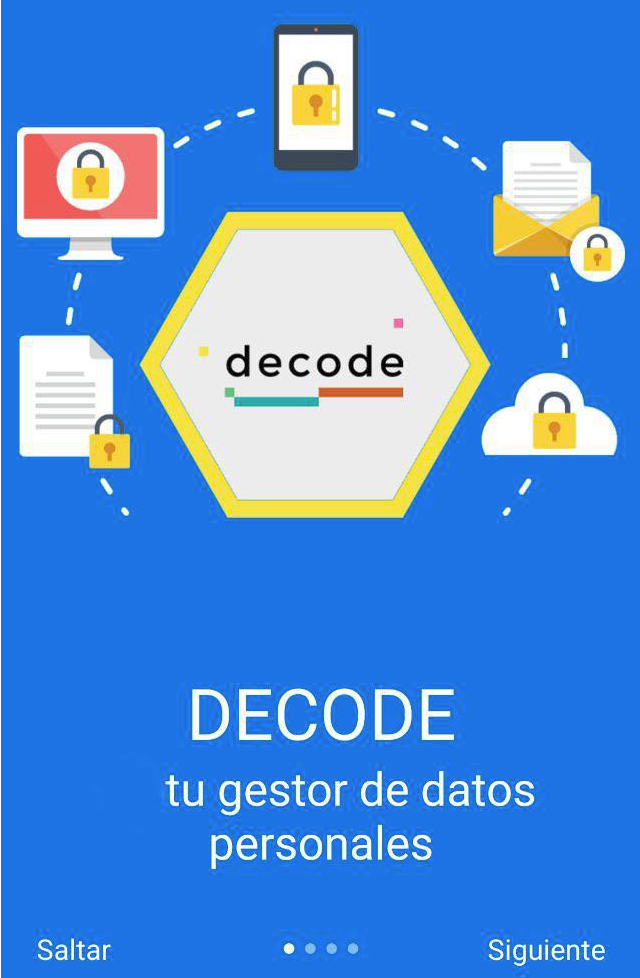
Screenshot of the DECODE app (beta version)
-
The DECODE distributed ledger, which registers any transactions between the DECODE app and Decidim, and regulates them via smart contracts. This pushes democratic processes towards greater transparency.
-
The BCCNOW dashboard, which allows user friendly visualizations of the data shared via the DECODE app. This aims to promote data empowerment and to boost the collective intelligence mobilized in Decidim processes.
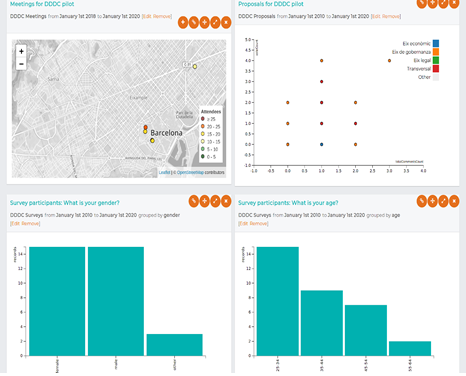
BCNNOW dashboard
The second aim was to facilitate a deliberative process around data regulation, governance and economics. This process wanted to provide a discussion and a vision of socioeconomic models involving greater citizen control over data and its exploitation under commons-oriented models, that is, models where people share data and allow open use while remaining in control over it, individually and collectively.
DDDC in brief: pilot structure
The DDDC participatory pilot had a total duration of six months and was developed in several phases, which ran between October 18th 2018 and April 15th 2019. Throughout the process, 8 face-to-face meetings were held across the city, connected with the activity developed in the dddc.decodeproject.eu platform, based on Decidim software.
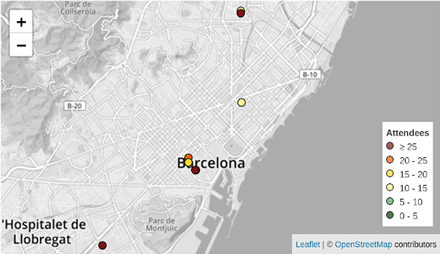
DDDC meetings in Barcelona
-
Presentation & diagnosis (2018/10/18 - 2018/11/14): the first phase of the process was dedicated to the elaboration of a brief diagnosis of the state of data regulations, governance models and economics, supported on the analyses previously developed in the context of the DECODE project. This phase also included the launch of a sociodemographic survey. The data from this survey allowed, in later stages of the process, to design communicative actions aimed at improving the inclusiveness of the process.
-
Proposals (2018/11/14 - 2018/12/21): during the second phase of the process, proposals were collected to address issues mapped during the diagnosis phase, including proposals derived from the previous work in DECODE. Likewise, a session of analysis of the survey sociodemographic data was carried out, and later linked to the design of communicative actions to improve inclusion in the process. The Barcelona Now (BCNNOW) dashboard developed by the Eurecat team was used for the analysis.
-
Debate (2018/12/21 - 2019/03/04): in the third phase, proposals from the previous phase were discussed.
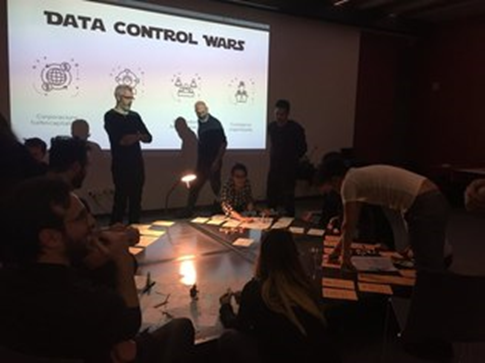
Data control wars: a performative event for exploring data futures
-
Elaboration (2019/03/04 - 2019/03/25): subsequently, there was a process of elaboration of the proposals, and the discussions, by the DDDC team and interested participants. Out of this the DDDC Manifesto resulted.
-
Signing (2019/03/26 - 2019/04/08): then came a central moment in the pilot, the collection of supports for the DDDC Manifesto using the DECODE technology for secure and transparent signature.
-
Evaluation (2019/03/26 - 2019/04/15): the process ended with the launch of a survey that helped to assess the satisfaction of participants with the process and with the DECODE technology.
-
Post-process (2019/04/15 - 2019/12/31): after the process comes a period of open debate of the DDDC manifesto resulting from the process.
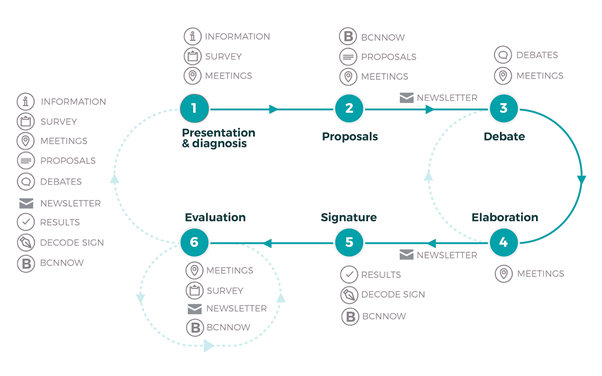
DDDC process structure
DDDC in brief: results
Three key types of results have come out of the process:
-
Technical. Firstly, the development of an new Decidim module interoperable with DECODE technology. Secondly, the first iteration of the DECODE app, which will continue its development in the forthcoming months. Thirdly, a key element yet to be incorporated into the system: the DECODE distributed ledger. The full system will be ready in late 2019.
-
Social. Throughout the process, near to 200 people participated online and another 200 attended face-to-face meetings. Perhaps more importantly, the process catalyzed the constitution of the Barcelona Data Commons network, composed by different local organizations working on the field of data. The network will launch its website soon and will compile tools ranging from the technological to the pedagogical, and from the legal to the practical.
-
Narrative. Its third key result has been the development of the Data Commons Manifesto, a participatory document that projects the vision of an alternative digital society and economy. It will remain open for comments and amendments (at least) until late 2019.
Conclusions
In summary, with the pilot Digital Democracy and Data Commons we have sought to improve Decidim using DECODE technology and to advance DECODE's vision through Decidim technology: digital democracy to build data commons; data sovereignty/autonomy and commons to improve democracy. With this double movement, DDDC brings together two projects that propose alternatives to surveillance capitalism. With its weaknesses and limits, we believe this is a path worth exploring.

 DECODE was funded by the European Union's Horizon 2020 Programme, under grant agreement number 732546.
DECODE was funded by the European Union's Horizon 2020 Programme, under grant agreement number 732546.